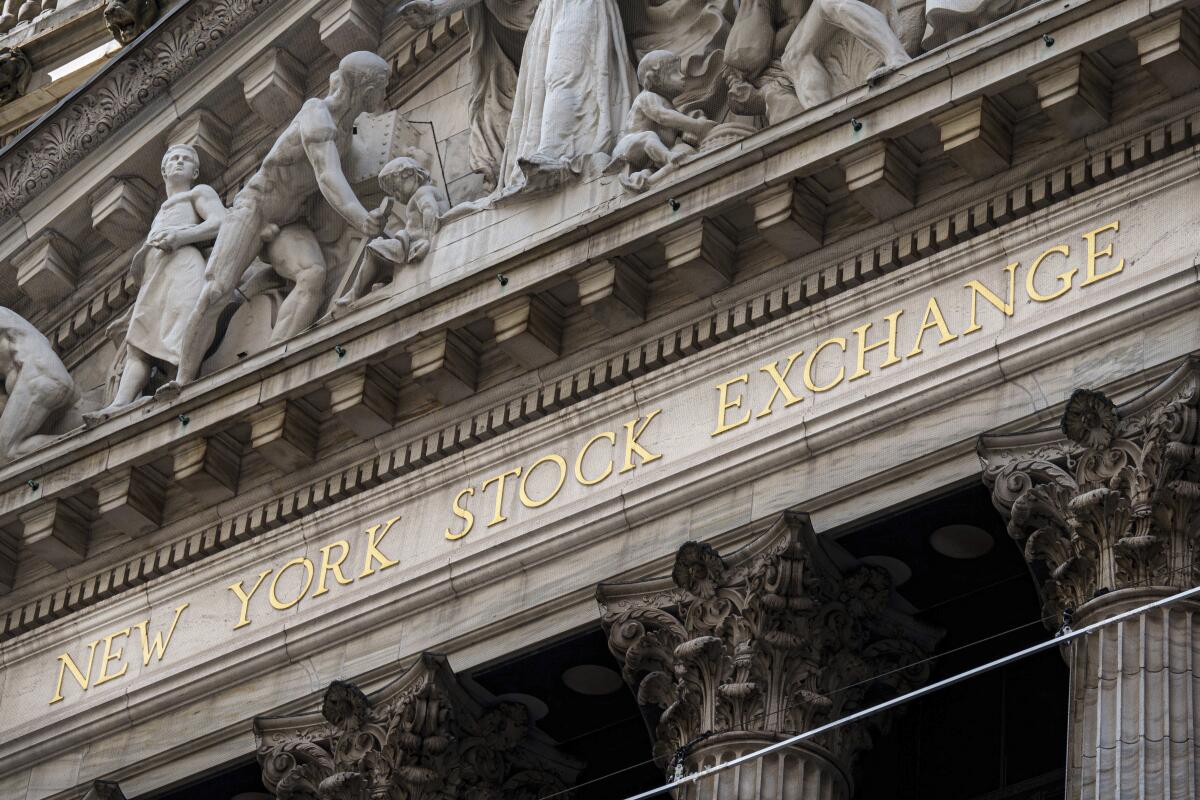Wall Street rebounds to its best day in weeks as Big Tech leads the way

- Share via
Wall Street burst out of its hangover Thursday, and U.S. stocks bounced back in a widespread rally after their worst day since September.
The Standard & Poor’s 500 gained 1.2% to recover three quarters of its sharp loss from the day before. The Dow Jones industrial average rose 1%, while the Nasdaq composite leaped 1.3%.
Big Tech stocks led the way in a mirror reversal of the day before, when Alphabet and Microsoft sank despite reporting stronger profits than analysts expected. Microsoft climbed 1.6% a day after falling 2.7%. Google’s parent company, Alphabet, added 0.8% after tumbling 7.5%
Big Tech stocks are Wall Street’s most influential because they’re the biggest, and they’re facing high expectations after soaring much more than the rest of the market last year. Amazon, Apple and Meta Platforms reported their latest results after trading ended Thursday and faced similar pressure to deliver big numbers to justify their runs higher.
Meta Platforms, the owner of Facebook and Instagram, was a star in after-hours trading. It surged after topping analysts’ expectations for profit and revenue and saying it would start paying its shareholders a dividend.
In a reversal from past decades, more college graduates and professionals are moving out of California than coming into it to escape the higher taxes and cost of living.
Stocks broadly got a boost after reports suggesting the economy remains solid, while pressures on inflation may be easing. Such data could give the Federal Reserve more of the evidence it wants of a slowdown in inflation before it will deliver the interest rate cuts that investors crave. A day earlier, stocks fell sharply after the Fed’s chair warned it doesn’t have enough such evidence.
Merck climbed 4.6% after the pharmaceutical giant delivered stronger profit and revenue for the latest quarter than analysts expected. Etsy jumped 9.1% after it added a partner from Elliott Investment Management to its board, who said he sees opportunity to significantly increase the company’s value.
On the losing end of Wall Street, New York Community Bancorp fell an additional 11.1% after plunging 37.7% a day before, when it reported a loss for its latest quarter and cut its dividend to build its financial strength. The surprising report caused stocks of other regional banks to tumble, reviving uncomfortable memories of the banking crisis last year that led to the collapses of Silicon Valley Bank, Signature Bank and others.
New York Community Bancorp had acquired much of Signature, and analysts say much of its struggles are related to that. But its losses tied to commercial real estate are a reminder of challenges that the entire industry faces. The KBW Nasdaq Regional Bank index fell 2.3% after Wednesday’s tumble of 6%.
Peloton Interactive dropped 24.3% after it gave a forecast for upcoming revenue that fell short of analysts’ expectations. That was despite its roughly matching forecasts for the latest quarter.
New research seems to support the idea that working from home leads to less productivity. But are employers measuring remote work results by the right metrics?
All told, the S&P 500 rose 60.54 points to 4,906.19. The Dow added 369.54 points to close at 38,519.84, and the Nasdaq rallied 197.63 points to 15,361.64.
In the bond market, the yield on the 10-year Treasury fell to 3.86% from 3.92% late Wednesday.
It sank after one report showed that slightly more workers applied for unemployment benefits last week than expected. Although no one wants workers to lose their jobs, the number is still low relative to history. And Wall Street wants to see a cool-down in the job market, which could keep a lid on inflationary pressures.
A separate report offered similar encouragement for traders. It said U.S. workers were much more productive in the last three months of 2023 than expected, producing more stuff per hour worked. Strong growth in productivity could allow workers to get bigger pay raises without adding more pressure on inflation.
“If companies can generate strong productivity growth, they will be able to control costs and protect margins without sacrificing talent in an environment of still-elevated wages and fading pricing power,” EY Chief Economist Gregory Daco said.
Data released later in the morning suggested the U.S. manufacturing industry is improving after struggling for more than a year under the weight of high interest rates. Manufacturing activity shrank for a 15th straight month in January, but not by as much as economists expected. Growth in new orders is helping to boost the industry, according to the Institute for Supply Management.
Potentially concerning, though, was that prices for raw materials increased in January after eight months of decreases.
Traders are increasingly betting the Federal Reserve will begin cutting interest rates in May, after pushing back expectations from March. Whenever it does begin, it would mark a sharp turnaround after the Fed raised its main interest rate to the highest level since 2001 in hopes of getting inflation under control.
High interest rates intentionally slow the economy, and they undercut prices for investments.
In stock markets abroad, London’s FTSE 100 slipped 0.1% after the Bank of England said it’s keeping its main interest rate at a near 16-year high as inflation in Britain unexpectedly rose to 4% in December.
Indexes were mixed across Europe and Asia.
AP reporters Matt Ott and Elaine Kurtenbach contributed to this report.
More to Read
Inside the business of entertainment
The Wide Shot brings you news, analysis and insights on everything from streaming wars to production — and what it all means for the future.
You may occasionally receive promotional content from the Los Angeles Times.












